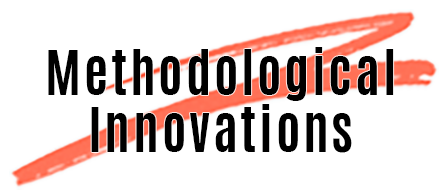
The following abstracts summarise what each of the presentations from the 2021 Methodological Innovations (MI) conference explored.
Stream A and B ran simultaneously, while the plenary could be attended by all.
For the programme, see here: https://www.plymouth.ac.uk/uploads/production/document/path/19/19763/MI_Conf_Programme_2021.pdf

Plenary Abstract:
Kitrina Douglas and David Carless
“Now I need a sanctuary, and you to stand beside me”: Songs and stories of inequity
Inequity can be defined as lack of fairness or justice. Health, illness and healthcare systems are, on this basis, areas of human experience rife with inequities in many forms. Sociocultural, political, economic, geographical and ideological inequity may come to bear on an individual, shaping her or his life horizons on a day-to-day basis. In this performance-presentation, we draw on narrative research we have conducted across a number of related contexts to consider the effects of all this at the individual level. We use arts-based methods such as storytelling and song writing to evoke the conditions that can impose on an individual as well as communal responses to care/advocate for those who need our support.
See reflections written about the plenary performance-presentation here:
See Kitrina and David’s bios here:
See three videos shared with us by Kitrina and David here:

Abstracts: Stream A
Louise Ryan and Jon Mullholand
Reflections on the use of Asynchronous Qualitative Longitudinal Research Methods in Contexts of Dramatic and Unexpected Changes ‘in the field’
In this paper we draw upon our research, conducted over eight years, not only to examine the challenges and opportunities associated with qualitative longitudinal research (QLR) methods, but specifically when the original research project was not designed to be followed up longitudinally. Researchers may find themselves confronted by dramatic and unexpected societal events that invite, or necessitate, re-engaging participants years after the original research project is completed. However, follow up research may be especially challenging when the team lacks the resources to support new data collection.In this paper, we reflect upon our experiences of using asynchronous methods (e-mail interviews) to collect new data with participants after a significant lapse of time in the light of our decision to re-contact our original study participants in the context of a potentially ‘unsettling event’, Brexit. We argue that when approached appropriately, e-mail based asynchronous longitudinal methods may offer a range of pragmatic advantages in such contexts. This may be especially useful now in the context of a global pandemic. Nonetheless, there are significant practical and ethical issues to be considered when embarking upon this type of research. Our paper contributes at the nexus between the emerging body of literature on unplanned QLR and scholarship on asynchronous, e-mail based interviewing.
See reflections written about Louise and Jon’s presentation here:
See a piece written for us by Louise and Jon here:
Yessica Abigail Tronco Hernandez
Adaptation of a Nominal Group Technique in a virtual environment during the COVID-19 pandemic
Background: Nominal group technique (NGT) is a method to elicit healthcare priorities from participants and reach a consensus. The five-stage process has been commonly used to develop clinical guidance and involves silent generation, round Robin, clarification, voting (ranking) and discussion.
Methods: Due to lockdown restrictions we adapted NGT to collect data from two virtual expert panels of patients and healthcare professionals. Information for silent generation was e-mailed to participants ahead of Zoom meetings; a whiteboard functionality replaced a flip chart, and Mentimeter (AB, Stockholm, Sweden) was used for anonymous voting and ranking of ideas.
Results: The modifications to the NGT allowed us to conduct highly productive panels and provided participants with a sense of autonomy while maintaining confidentiality and transparency. This method requires internet access and an electronic device, as well as time to teach participants how to use the virtual tools. However, it allowed us to recruit participants from across the UK, without requiring travel. The virtual environment allowed additional anonymity since participants could join without video.Conclusion: NGT can be successfully adapted to a virtual environment, bringing further advantages to the method. Technological abilities and time to enable the use of online tools should be considered.
See reflections written about Abigail’s presentation here:
See a piece written for us by Abigail here:
Ruthe Castro de Aquino Pinheiro
COVID-19 PANDEMIC AND POLITICAL CRISIS: A STUDY ON IMPACTS ON BRAZILIAN MENTAL HEALTH
Introduction: The social distance recommended by the World Health Organization, aims to contain the advancement of covid-19. The President of Brazil’s denial speech in relation to the pandemic has reduced the serious illness of the covid-19 since the beginning of the public calamity decree to a simple “flu”. Objective: This study deals with an analysis of the factors that affected the mental health of the Brazilian population caused by the covid-19 pandemic and the political implications in conducting the treatment of the disease. Methodology: qualitative, exploratory research. Articles and publications related to the theme of the covid-19 pandemic, political crisis and mental health, between 2020 and 2021 were used. Results: Exposure to psychosocial stressors of the covid-19 pandemic, cause emotional responses, and harm physical health and mental. The political crisis in Brazil is also aggravating the mental health of the Brazilian population, from the circulation of false news on social networks, and even treatments without scientific proof. Conclusions: The psychosocial factors generated by the covid-19 pandemic, and the current political crisis, can be the object of studies in the post-pandemic, in order to analyze the negative impacts on the mental health of the population in the long term.
See reflections written about Ruthe’s presentation here:
See a piece written for us by Ruthe here:
Suparna Bagchi
Research during COVID-19: Ethical Conundrums
Universities, with their extensive technological resources, have moved to a predominantly online platform amidst COVID-19, which poses ethical challenges to researchers undertaking virtual research studies. Strong ethical principles should guide research. It is tricky when a researcher researches sensitive topics with minors virtually based on teacher conducted classroom activities. The schools have granted limited access to the children, thus placing the researcher in a considerably invisible and formal position. The research requires children’s active involvement in the meaningmaking of their lived experiences. Can just a few introductory video clips by the researcher suffice in striking a familiarisation with the students? Another ethical dilemma arises from the risk of partial and insensitive treatment towards children. Student-teacher relationships are based on strong hierarchical power relationships. The teacher needs to be careful not to influence and objectify the children so that they can express their feelings fully. The researcher needs to recognise that a teacher’s role is different from a researcher’s role, which might bring in variations in the research study. Mutual trustworthiness and negotiated ethics become the essential criteria in this teacher-researcher collaborative venture. While there are valuable resources available on virtual research techniques, it is necessary to discuss their ethical dimensions.
See reflections written about Suparna’s presentation here:
Mary Catherine Garland
Re-imagining writing: writing with covid
Taking a posthumanist approach with all bodies, human and nonhuman, always acting in relational play, the invisible coronavirus is an animating force disrupting daily lives: rupturing thinking, doing, reading and writing. With all bodies in Deleuzo-Guattarian ‘assemblages’ having ‘a capacity to affect [and] be affected’ (Massumi in ‘notes on the translation’ in Deleuze and Guattari: 2015), this paper will focus on the process of writing with covid: writer selves shifting from becoming unable to write when covid first struck close to home, to ‘writing to’ covid (Wyatt and Gale: 2017) encouraging writing to be emergent, to attempting writing in the moment as practices of immanence engage frictionally with academic writing conventions. Adopting Erin Manning’s approach to Gilbert Simondon’s concept of ‘information’ to enable a troubling of fixities, a writing taking risks, a writing allowed to ‘sprout deviant’ (Massumi: 2002, p.18) emerges.
With this covid-inspired writing- moving resisting the pressures of conventional academic writing and the traditional PhD thesis format, this paper will move towards covid as an animating force: inspiring the adoption of a processual, (non)methodological approach to inquiry, perhaps offering a glimmer of something new being created, something not yet known.
See reflections written about Mary’s presentation here:

Abstracts: Stream B
Juliet Hall
On Being an Insider: The impact of auto/biographical research on the researcher
This paper draws on my doctoral research which explores the narratives of parents raising autistic children. Auto/biography allowed me to use my life experience as a ‘resource’ to help make sense of respondents narratives. As the mother of autistic children, my position as an ‘insider’ facilitated a reciprocal research relationship and enabled deeper engagement with participants. I was able to identify with, empathise and reflect upon shared emotions and experiences with most of my participants, at least some of the time.
There were instances where I found it difficult to connect with respondents. In some interviews I could not identify with respondents experiences. This caused unexpected emotional tension for me, that was audible to me in the interview recording, and evoked an emotional response when transcribing the interviews. In one interview, I felt a sadness and empathy for the child as the mother described her actions to ‘train’ her child to behave in a certain way and conform to her
expectations. This demonstrates the potential impact of auto/biographical and insider research on the researcher. It highlights the need for reflexivity in the research process and explicit acknowledgement of the subjectivities of the researcher.
See reflections written about Juliet’s presentation here:
See a piece written for us by Juliet here:
Juliet also co-organised the DNM event (2023). See more about this event and Juliet’s profile for this here:
Gayle Letherby
Stories of and from solitude: examples of sociological fiction as a way of working within, besides and beyond the academy
I have been writing (sociological) fiction for just over a decade now. Following two significant bereavements fiction (and memoir) writing became an important part of the griefwork (Davidson 2008, Letherby and Davidson 2015) I did alone and with others. My sociology has always been auto/biographical and political and my fiction and memoir writing is too. Some of the fiction I write is explicit sociological fiction (written specifically to generate sociological knowledge), all of it is informed by my sociological self. For me this way of working, of writing, of academic storytelling, blurs the boundaries of ‘fact’ and fiction and moves between the academic and the personal. It also has, I believe, implications for the ways in which we define, and attempt to enact, impact within, besides and beyond the academy. Since March 2020 my own (sociological) fiction has, not surprisingly been influenced, by Covid-19 including experiences of solitude, isolation and community. In this paper in addition to making the epistemological case for fiction within sociology I read some recent stories of my own.
See reflections written about Gayle’s presentation here:
See Gayle’s bio here:
See Gayle’s presentation from the conference here:
Clare Pettinger
A Creative Response to Food Issues during the COVID19 lockdown: Singing Out the Anger
COVID-19 has ‘shone a light’ on all that is precarious within our food system. The pandemic has been termed as a ‘crisis on a crisis’ (Taylor, 2020) because it has forced more people into food insecurity (Loopstra, 2020) and accentuated nutritional and health inequalities. Due to the transdisciplinarity of our food matrix, I have often felt ill-equipped, both personally and professionally, to deal with its many complex facets. COVID-19 has heightened this sense of frustration for me.
As ‘The Singing Dietitian’ I offer a light hearted yet critical auto- biographical/ethnographical
approach to sharing socially impactful food stories. I have written songs that relate to my observations of the covid situation, exemplifying the complex and often polarized nature of food issues across the socio-economic spectrum. Songs, it seems, hold story fragments that escape a temporal plot, and polar tension that co-exist (Douglas, 2016, p.2).
This session will appraise song writing as my creative response to the COVID-19 crisis. I will perform a song, and then critique it as a reflective process, a creative method and a potential tool for transformation, enabling expression, different forms of knowing and more awareness of health and social justice issues and activism (see Pettinger 2021).
See reflections written about Clare’s performance-presentation here:
See two videos from Clare here:
Julie Parsons
“How’s your week been?” Reflections on the use of texts, emails and phone-calls as methods of data collection during the COVID-19 lockdown.
In this presentation I reflect on methodological issues arising from a British Academy Covid-19 research grant, ‘finishing time at a distance: an exploration of support mechanisms for socioeconomically disadvantaged and criminalised individuals during the Covid-19 crisis and beyond.’ The research has been conducted with LandWorks CIO (LWC), a resettlement charity that provides a supported route into employment and community for prisoners and people on community sentences (collectively called trainees), many of whom are socio-economically disadvantaged in terms of employment, housing and health indicators. Since lockdown LWC have maintained and/or re-established relationships with former trainees and this research follows some of their journeys between September 2020 and March 2021. In the absence of face-to-face support for those released into the community after punishment, the research explores the ways in which the research has engaged with individuals through the exchange of weekly texts, images and phone calls to a mobile phone number specifically set up for this purpose, which have then been used to inform semi-structured interviews. To date fifteen people have engaged in a modified photo-voice activity documenting their covid-19 experience(s). I report here on some of the benefits and dis/benefits of using non face-to-face approaches to research.
See reflections written about Julie’s presentation here:
See Julie’s bio here:
See Julie’s presentation from the conference here:
Lyudmila Nurse, Lisa Moran and Maggie O’Neill
Remaking Biographical Futures: Reflections on Risk, Technology and Ethics in an era of Social Distancing
This presentation focuses upon the place of biographical research in remaking novel futures during Covid-19, raising questions about ethics, risks and new technologies in biographical interviewing. It is based on the authors’ on-going biographical research, publications and talks at the ESA RN03 mid- term conference, IVth ISA Forum of Sociology and most recently at the BSA conference. New societal circumstances of physical distancing, isolation and touch avoidance, social fragmentation, and increased risks of trauma and vulnerability to populations changed social landscapes beyond recognition challenging how social scientists study biographical aspects of everyday life experiences. Biographical research responds to this new (and multidimensional) ‘social present’ theoretically, empirically and analytically from perspectives on interconnections, continuities, fragmentations, disjuncture and turning points in past, present and future events. The new social present challenges core elements of biographical methods however: the in-depth interview, raising novel questions about trust, responsibility for interviewees’ welfare during and after interviewing, social distancing, researcher self-care, and data reliability. In this paper, we consider pros and cons of the move to online interviewing while negotiating “immersion” in life worlds, risk and social distancing as a result of Covid-19.
See reflections written about Lyudmila, Lisa and Maggie’s presentation here:
See a piece written for us by Lisa here:
